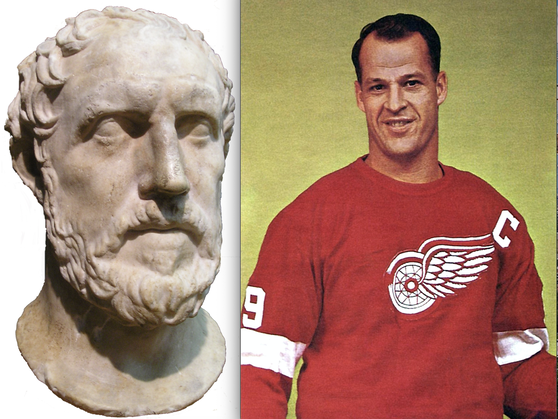|
My blog posts revolve around my interests and vocation as a historian: the intersection of history and contemporary church life, the intersection of history and contemporary politics, serendipitous discoveries in archives or on research trips, publications and research projects, upcoming conferences, and speaking engagements.
I sometimes blog for two other organizations, the Canadian Baptist Historical Society and the Centre for Post-Christendom Studies. The views expressed in these blogs represent the views of the authors, and not necessarily those of any organizations with which they are associated. |
Gordie Howe is one of the most famous hockey players in hockey lore. And Canadian hockey fans know that a “Gordie Howe Hat Trick” is an expression for the perfect or complete game – one that includes a goal, an assist, and a fight. Of course, the pugilistic third part of the equation may irk or mystify some, but it nonetheless captures what some deem to be an ideal game, the perfect night, or the complete package. As one who likes to use hockey analogies for parts of everyday life, I think that the expression a Gordie Howe Hat Trick – the complete package – can be tweaked to refer to the complete package when it comes to what historians do. And that expression would be a “Thucydides Hat Trick”. Thucydides is considered to be one of the great historians of antiquity, a progenitor of the modern study of evidence to determine the course of past events. He is, in a sense, a Gordie Howe of historians – one of the greats.
That being the case, what would be the complete package for a historian? What would be the marks of a great game? Or what should someone strive for when seeking to be the best historian they can be? While there are three marks to a Gordie Howe Hat Trick, there are five marks to a Thucydides Hat Trick.
One key mark of good historians is how they deal with primary sources (such as diaries, newspapers, sermons, official statements, and so on). The historian’s treatment of sources must take into account a range of factors, such as language, context, genre, and authenticity. Attention to such matters is critical, for misuse or mishandling of primary sources effectively invalidates everything else an historian has to say on the matter.
It is critical that historians are aware of what others have said about the issue at hand – and those secondary sources (eg. books, journal articles) must be relentlessly tracked down and incorporated into one’s assessment of the significance of the evidence of argument. In other words, how does one’s research findings relate to the conclusions of others – do they correct, nuance, discredit, or confirm what others have said? And how do the works of others shape the interpretation of the sources?
Unless providing a chronicle of dates and events, arguments (eg. a thesis) must be made. And arguments must be more than a pedestrian statement of what is obvious. The gathering of material is for a purpose, and that purpose is to argue something such as a person’s motives, the intent of governments, the meaning of documents, the cause(s) of an event, and so on. In sum, evidence is being marshalled to make a claim about why, who, when, where, what, or how. And the arguments should be compelling – at least as much as the evidence allows for.
There are history books I have a hard time reading, and there are others that I have a hard time putting down. The difference is the use of prose. Some historians have a wonderful gift of writing that makes for a pleasurable reading experience – but every historian needs to work on the craft of writing well. To get there requires reading the works of great historians in order to see how it is done well. It also requires relentless attention to editing and proofreading – aiming for both accuracy and artistry.
Finally, I know some historians who are absolutely brilliant in their research, and produce copious amounts of books and articles, yet at the same time are arrogant jerks. While they may have a powerful cv, they fail the test of character. And in my opinion, being a person of integrity, kindness, and humility is a critical mark of being a good historian. It is never worth it to gain a powerful cv but lose your soul. It is also a matter of trust – how can I trust the results of someone who lacks fundamental decency, for if the person mistreats others with contempt that will probably be reflected in how the person treats the historical record as well. There are numerous books on how to be an effective historian. For a brief introduction to researching the history of Christianity, see Doing Church History.
2 Comments
Alan Hayes
9/13/2022 02:34:01 pm
What a very helpful concise statement of the essentials!
Reply
Dudley Brown
9/26/2022 02:38:34 pm
A "Hat Trick" that should be foundational to every book and article one writes.
Reply
Leave a Reply. |
Archives
May 2024
|

 RSS Feed
RSS Feed
